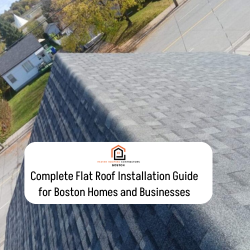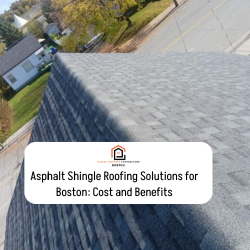Flat roofs have gained popularity in both residential and commercial properties due to their modern look and practicality. Flat roofing systems, however, require specific considerations and expert installation to withstand Boston’s unique climate challenges. Whether you’re a homeowner or a business owner, understanding the process of flat roof installation in Boston and knowing when roof replacement in Boston is necessary can help you make informed decisions.
This guide covers the essential steps, materials, and maintenance tips for a successful flat roof installation. Let’s dive into what you need to know for an effective flat roof project in Boston.
Why Choose Flat Roof Installation in Boston?
Flat roofs offer a range of benefits, especially in urban areas like Boston. Here are some of the main reasons why property owners are choosing flat roofs:
1. Cost-Effective Installation and Repairs
Compared to pitched roofs, flat roofs generally have a lower installation cost. The materials used for flat roofing tend to be less expensive, and the installation process requires less time, making it a budget-friendly choice.
2. Energy Efficiency and Weather Resistance
Flat roofs provide excellent energy efficiency, especially when coated with reflective materials. These materials can reduce cooling costs in the summer, which is particularly useful during Boston’s hot, humid months. Additionally, modern flat roofing systems offer excellent weather resistance, crucial for standing up to New England’s snowy winters.
3. Versatile Usable Space
Flat roofs offer the advantage of extra usable space, which can be transformed into a rooftop garden, patio, or equipment area. For commercial properties, this space can be used to install HVAC systems or other equipment without taking up valuable interior space.
Key Flat Roof Materials for Boston Properties
Selecting the right material is a critical step in flat roof installation. Each material comes with its own set of benefits, and some may be more suitable for Boston’s climate than others. Here’s a breakdown of popular flat roofing materials:
1. EPDM (Ethylene Propylene Diene Monomer)
EPDM is a durable, synthetic rubber roofing material that is highly resistant to UV rays and extreme weather conditions. It’s ideal for Boston’s fluctuating climate because of its flexibility and resilience, allowing it to withstand cold winters without cracking or shrinking.
2. TPO (Thermoplastic Polyolefin)
TPO roofing is a single-ply membrane that is known for its energy efficiency and resistance to mold growth. Its reflective surface makes it an excellent choice for properties looking to reduce energy costs. Additionally, TPO’s strength and resistance to tears make it a reliable choice for both residential and commercial flat roofs.
3. PVC (Polyvinyl Chloride)
PVC is another single-ply roofing material that’s popular for its durability and fire resistance. Known for its white color, PVC reflects sunlight, reducing heat absorption. This material is also highly resistant to chemical exposure, which makes it suitable for commercial buildings.
4. Modified Bitumen
Modified bitumen is an asphalt-based roofing material that is commonly used in flat roofing due to its strength and flexibility. It consists of multiple layers, offering additional insulation and durability. Modified bitumen can withstand Boston’s harsh winters, making it an excellent choice for long-lasting protection.
Step-by-Step Flat Roof Installation Process in Boston
Installing a flat roof requires careful planning and expertise. Here’s a look at the general process followed by reputable roofing contractors in Boston.
Step 1: Initial Inspection and Assessment
Before beginning the installation, a professional inspection is essential. The contractor will assess the existing roof structure to ensure it can support a flat roof system. During this phase, they’ll check for underlying issues, such as rot or water damage, that need to be addressed before installation.
Step 2: Choosing the Right Insulation
Insulation is crucial for flat roofs in Boston’s climate. Proper insulation prevents heat loss in winter and helps maintain a cool interior in summer. Common insulation types include polyisocyanurate, EPS (expanded polystyrene), and XPS (extruded polystyrene). The chosen insulation type is layered beneath the roofing membrane for optimal energy efficiency.
Step 3: Installing the Waterproofing Membrane
After laying the insulation, the next step is applying a waterproofing membrane. This layer is essential in preventing leaks and water damage. Materials like TPO, EPDM, or PVC are commonly used as the membrane, depending on the specific needs of the property. The membrane is either adhered, mechanically attached, or ballasted to the roof deck, creating a watertight seal.
Step 4: Sealing and Flashing Installation
Flashing installation is essential for areas where the roof meets walls, edges, or other structural components. Proper flashing ensures that water doesn’t seep into vulnerable areas, protecting the interior of the building. Quality sealing and flashing are essential for maintaining the roof’s integrity and preventing water damage over time.
Step 5: Final Inspection and Quality Check
Once the installation is complete, a final inspection ensures that everything is properly installed and secure. The contractor will review all seams, joints, and flashing to confirm that the roof is watertight and built to last. After this inspection, your new flat roof is ready to protect your home or business from Boston’s diverse weather.
Maintenance Tips for Flat Roof Longevity
Regular maintenance can significantly extend the life of your flat roof. Here are some tips to help keep your roof in top shape:
1. Routine Inspections
Schedule regular roof inspections, especially after severe weather events. Inspections can help identify potential issues like cracks, punctures, or pooling water before they escalate into larger problems.
2. Clean Debris and Ensure Proper Drainage
Flat roofs are prone to water pooling, which can lead to leaks and structural damage. Clearing debris from the roof and ensuring that drains are not blocked will help prevent water buildup.
3. Address Minor Repairs Promptly
Don’t wait to repair minor damage. Small issues, like punctures or tears in the membrane, can quickly worsen if not addressed. Reach out to a trusted contractor in Boston for roof repair services to tackle minor issues before they escalate.
4. Monitor for Ponding Water
Ponding water can weaken the roof structure and lead to leaks. If you notice areas where water collects and doesn’t drain, contact a professional to assess the slope and drainage.
When to Consider Roof Replacement in Boston for Flat Roofs
Even with excellent maintenance, flat roofs will eventually need replacement. Here are signs it might be time for roof replacement in Boston:
Age of the Roof
Flat roofs typically last between 20 to 30 years, depending on the material and maintenance. If your roof is approaching this age range, consider having a professional inspection to assess its condition.
Frequent Repairs
If you find yourself needing frequent repairs to address leaks or membrane issues, it may be more cost-effective to replace the roof. Frequent repairs can indicate that the roof’s structural integrity is compromised, and replacement may offer a longer-term solution.
Visible Damage or Deterioration
Cracks, blistering, or severe membrane wear are signs that the roof is nearing the end of its life. Visible damage can lead to leaks and other problems, so replacing the roof sooner rather than later can help protect your property.
Finding the Right Contractor for Flat Roof Installation in Boston
Choosing a reputable roofing contractor is essential for a successful flat roof installation. Here are tips for finding the right professional in Boston:
1. Verify Experience and Certifications
Look for contractors with extensive experience in flat roof installations and a portfolio of completed projects. Verify certifications and check that they are licensed and insured.
2. Read Customer Reviews and Testimonials
Customer reviews provide insights into the contractor’s reliability, workmanship, and customer service. Check Google reviews, Yelp, and other trusted review platforms for feedback from previous clients.
3. Request a Detailed Estimate
A reputable contractor will provide a transparent, itemized estimate that outlines labor costs, material costs, and any additional fees. Avoid contractors who offer vague pricing or request full payment upfront.
4. Ask About Warranties
Quality contractors will stand by their work and offer warranties on both materials and labor. Understanding the warranty terms can give you peace of mind and protect your investment in the long run.
Frequently Asked Questions (FAQs)
1. How long does flat roof installation take in Boston?
Flat roof installation typically takes 2-5 days, depending on the size of the roof and weather conditions. A professional contractor can provide a more accurate timeline based on your project.
2. Can flat roofs withstand Boston’s snowy winters?
Yes, with proper materials and insulation, flat roofs can handle Boston’s winter weather. Selecting materials like EPDM or TPO can enhance the roof’s weather resistance.
3. What is the average cost of flat roof installation in Boston?
Costs vary based on materials and labor, but on average, flat roof installation can range from $5,000 to $15,000. Requesting multiple quotes from contractors can help you find the best price for your budget.
Final Thoughts: Is Flat Roof Installation Right for You?
Flat roofs offer a modern, cost-effective solution for homes and businesses in Boston. They provide additional space, energy efficiency, and are a versatile choice for urban settings. However, proper installation, routine maintenance, and timely roof replacement are essential for ensuring the longevity and durability of your flat roof.By partnering with a trusted contractor experienced in flat roof installation in Boston, you can enjoy the benefits of a durable, weather-resistant roof that meets the demands of the local climate.


